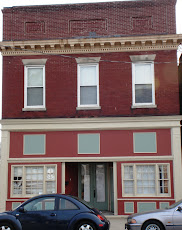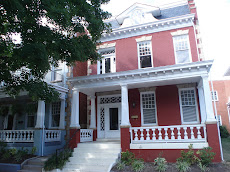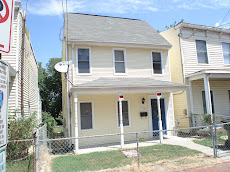By Carol Hazard TIMES-DISPATCH STAFF WRITERPublished: August 21, 2010
About 800 properties in the city of Richmond are vacant and uninhabitable.
An additional 800 could be lived in but need work. And 800 other vacant properties are in good condition, said Rachel O. Flynn, director of planning and development for Richmond.
In all, the city is dealing with about 2,400 vacant properties, said Flynn, who spoke yesterday during a presentation at the Federal Reserve Bank of Richmond.
More than 100 city leaders, representatives from nonprofit and civic groups, and real estate agents gathered for the session on "Turning Around Vacant Properties in Greater Richmond."
Neglectful property owners can be cited for blight and be required to submit plans to the city to fix the problems. If they do not improve the properties, the city can take possession through court procedures.
Take, for example, 106½ E. Clay St. The owner refused to comply with code enforcement and would not sell it to the city. The city petitioned the court to have the property condemned and took possession.
The Alliance to Conserve Old Richmond Neighborhoods, a nonprofit housing group, bought the property from the city for $67,459, then sold it contingent upon a development agreement for essentially the same amount to a developer.
The city also can take over properties if taxes are not paid.
The process is lengthy and cumbersome, speakers at yesterday's session said. The event was presented by the Richmond Fed, Virginia Local Initiative Support Corp. and the Partnership for Housing Affordability.
Sometimes owners are cooperative but they have no money to fix their properties or there is no market to sell them. In some cases, the government can intervene with subsidies, Flynn said.
It's important to create neighborhoods that can survive on their own without government subsidies, where private industry sees possibilities and makes investments, she said.
Richmond's problem with blight has escalated since 1949, when trolleys were removed and people became dependent on automobiles. Many abandoned the city for the suburbs.
"This is what it looked like 100 years ago," said Flynn, pointing to a photo of a vibrant downtown with sidewalks teeming with people and a trolley running down the center of Broad Street.
"There is no reason we can't have that today," she said, noting the link between public transit and neighborhood revitalization.
Greg Lukanuski, assistant city attorney, said building codes do a good job of getting property owners motivated to fix dilapidated structures. However, some people do not have the physical, financial or mental wherewithal to deal with the changes.
If the city takes an elderly woman to court for blight, most of the time the family comes to the rescue and corrects the problems, Lukanuski said. Still, it makes for an uncomfortable situation.
Often, the homeowner's sole source of income is Social Security benefits, which gives the person money to cover food, utilities and taxes but not enough for maintenance.
Property owners must be given notice of a violation and time to fix it, before a court summons is issued and the city can move to take over properties, Lukanuski said.
Some slumlords are good at ducking code-enforcement inspectors, he said. They might get lots of notices of violations, but they never go to court because they can't be found, Lukanuski said.
Bonnie Ashley, senior assistant attorney for the city, said a property with taxes that haven't been paid for a year and a half could be taken to public auction in nine or 10 months under the best and fastest scenario.
It's typically a two-year process, but it can take longer, she said.
Take, for example, a 100-year-old house that was maintained by the original owners. Generations of heirs inherit the property, and each person owns a small portion. The problem often is getting someone to step up, pay the taxes and take control, she said.
Re-print to Kerry Riley's blog August 23, 2010
Monday, August 23, 2010
Thursday, August 5, 2010
Yikes! Richmond Developer may be headed for the Big House
FBI, IRS raid French office
August 5, 2010 by Aaron Kremer
Officers from the FBI and IRS raided the Shockoe Slip offices of embattled developer Justin French this morning.
The FBI’s Richmond office would not say why, only confirming that agents are there. RBS’s reporter on the scene said law enforcement entered French’s office near 13th and Cary Streets with empty boxes, presumably to gather documents. State troopers were also present.
It may have to do with French’s use of historic tax credits on his developments, which involve converting former industrial buildings into residences and selling federal tax credits to investors.
Several partners who worked with French on various aspects of the historic tax credit deals said they did not know he was under investigation.
French is not at the office.
Stay with RBS for more as this story develops.
August 5, 2010 by Aaron Kremer
Officers from the FBI and IRS raided the Shockoe Slip offices of embattled developer Justin French this morning.
The FBI’s Richmond office would not say why, only confirming that agents are there. RBS’s reporter on the scene said law enforcement entered French’s office near 13th and Cary Streets with empty boxes, presumably to gather documents. State troopers were also present.
It may have to do with French’s use of historic tax credits on his developments, which involve converting former industrial buildings into residences and selling federal tax credits to investors.
Several partners who worked with French on various aspects of the historic tax credit deals said they did not know he was under investigation.
French is not at the office.
Stay with RBS for more as this story develops.
Monday, August 2, 2010
Richmond Real Estate Merry Go Round - Massive Foreclosure of Justin French's empire
This is a re-print of an article in Sunday's Richmond Times Dispatch about local developer Justin French and a massive foreclosure in the works for some prime City of Richmond multi-family properties.
Developer Justin G. French, 39, is in the midst of a battle royal with a giant specialty insurer in Henrico County and five local banks.
By Carol Hazard TIMES-DISPATCH STAFF WRITERPublished: August 01, 2010
Developer Justin G. French went from declaring bankruptcy days after leaving federal prison to dealing in millions of dollars in Richmond properties.During French's 13 years in Richmond, his business associations have included Donald C. Lacey, who pleaded guilty this year to a real estate Ponzi scheme, and some of the area's biggest financial players.
French, 39, is in the midst of a battle royal with a giant specialty insurer in Henrico County and five local banks scrambling to salvage tens of millions of dollars that they lent to him on 14 real estate projects. All the loans are in default.
Last week, Richmond-based Union First Market Bank was granted court permission for a receiver to manage and control six entities involving eight properties and recover $14.2 million in loans guaranteed by French. And Hampton Roads Bankshares Inc. in Norfolk is investigating $19 million that it agreed to lend to French for two unfinished apartment conversions, also in default, in Richmond's Scott's Addition, just west of Boulevard.
French blames his problems on Markel Corp., an insurer and business partner on historic tax credit projects, for withholding $3 million and leading him to the unusual step of asking the banks to foreclose on his own properties. Markel has not responded to repeated calls and e-mails for comment.
French, through several companies, owns more than 100 properties in the city, according to the assessor's office. Most are in the inner-city core, where he has played an important role revitalizing once-decaying neighborhoods."He has been one of the urban pioneers to revitalize Richmond and bring much-needed housing for a variety of citizens from young urban professionals to empty nesters," said Rachel O. Flynn, director of planning and development review for the city.
One of his latest projects is an $11 million conversion of a former Philip Morris USA plant in the Manchester section into 225 residential units. "It's very simple, very tasteful," Flynn said.
But French's tactic of using historic tax credits to offset renovation costs has hit a roadblock.
"We have a substantial number of applications from French that we have been unable to act on because of ongoing questions about the expenses claimed," said Kathleen Kilpatrick, director of the state Department of Historic Resources.
"We look at whether the work has been completed in accordance with appropriate preservation standards. We look at whether the line item is an eligible expenditure. We also look at the expenditures themselves, whether the expense claimed is in line with what we would expect to see."
She declined to say how many of his tax-credit applications are in limbo.
. . .
French says he came to Richmond in 1997.
In 1994, while a student at the George Mason University School of Law, French and another man were charged with conspiracy to possess with intent to distribute cocaine and aiding and abetting the use of firearms in relation to a drug-trafficking crime.
He pleaded guilty in a plea bargain and was sentenced to five years on each of the two counts in 1994.
He was released from federal prison in August 1996.
"On the case you reference 16 years ago, I was set up and entangled in a conspiracy charge," French said. "I regret that I allowed myself to be connected to people the authorities had targeted. But I fully cooperated with authorities, and I am proud of what I have done in life since that mistake."
French filed for bankruptcy protection in U.S. Bankruptcy Court in Richmond two days after his release from prison. Eleven months later, in July 1997, he signed on as a loan officer with Westover Investment Corp. He was attracted there, he said in a filing in Richmond Circuit Court, by the company's promise that it had a good system of referrals for customers. By late winter, he quit.
Westover complained he wouldn't return files and records when it sued for $20,000 and a court order to enforce an employment contract with a noncompete clause. French and the company settled out of court.French stayed in the real estate business, doing hundreds of deals.
In 2003, seven years after filing for bankruptcy, he bought a Georgian mansion in Richmond's West End for $1.8 million. It now is assessed at $2 million.
"I have worked hard, saved and sacrificed to earn everything I have ever owned in life," French said.
French and his wife, Tanya, hosted a benefit in their home, called Westbourne, for the Richmond Symphony in 2005. They reigned as king and queen for the Mardi Gras party, and guests wore beads, masks, crowns and costumes.
He is a former member of the boards of Junior Achievement of Central Virginia and The Faison School for Autism. The website for his business, French Consulting Co., said he is a member of the Kiwanis Club of Richmond, Kinlock Golf Club and The Country Club of Virginia.
His real estate agent was Lacey. French was a business associate with Lacey in limited liability companies, including MJD Properties, and he has ties to another Lacey company, Capital Funding & Consulting in Henrico.Lacey, who will be sentenced Tuesday for his role in the Ponzi scheme, solicited money from investors through Capital Funding & Consulting.
The money was supposed to be used to buy fixer-uppers in Richmond and flip them for a profit. But in most cases, the work never was done, and money was moved from one property to another in a complex money trail.
Lacey no longer is involved in Capital Funding & Consulting. However, the company is a beneficiary of a deed of trust on a property owned by French, according to a lawsuit filed July 15 by Union First Market Bank against entities in the foreclosure process owned by French.
In a lawsuit filed last year, one of Lacey's investors, Allan Mullian, alleges that French was one of several people in addition to Lacey and MJD who guaranteed a $52,000 note.
French has sought to distance himself from Lacey. In a Richmond Circuit Court filing, he said Lacey promised French and French's wife, along with other principals in MJD, that Lacey would indemnify them against any losses or liabilities from the company's dealings.
"I have had no dealings with Lacey, other than being a victim, like so many others," French said.
He said he was in partnerships with Lacey more than five years ago and he guaranteed some old notes.
"I have been successful in restructuring them, and all payments are current," French said. "Many of the properties have sold or are under contract currently. To a large extent, I am one of the only people that have protected the other victims, at great personal expense to myself."
Joel Fine from the Asheville, N.C., area said French has restructured seven of 12 notes that French along with Lacey and others personally guaranteed. French is making monthly payments on those new notes.
"Justin, from the get-go, has never tried to duck his responsibilities," Fine said.
Still, the legal wrangling continues. Two foreclosed properties guaranteed by French were repossessed, but they haven't closed or settled. Three are encumbered with old judgments, and Fine can't get clear titles.
In all, Fine and his family invested $750,000 through Old Dominion Financial Services Inc., a now-defunct company in Henrico that funneled money to companies involving French and Lacey. The Fines discovered they have money in 45 fixer-uppers in Richmond, and they are trying to determine the extent of their losses.
. . .
City tax records show French owns 135 properties, through several limited liability corporations.
Courthouse land records show Lacey sold him four parcels around North Davis and Robinson streets in the Fan District for $1.4 million in 2006. French's Church Hill Properties LC business borrowed $1.7 million on the properties with a note that was to be repaid within six months. On the due date, the mortgage company agreed to accept $410,000 and extend the due date for the balance.
In May 2007, Lacey transferred to French a 45,000-square-foot commercial building at 1700 Summit Ave. through a deed of distribution, usually used to give property to heirs when a will is executed.
At the same time, French arranged a $2 million loan from the Bank of Richmond, using the building as security. Within seven months, he refinanced, taking out a $9.9 million loan on the security of the property, courthouse records show.
Lacey also transferred 207, 209 and 211 E. Main St. to French, through another kind of tax-exempt deed meant for transactions in which no money changes hands. French borrowed $1.8 million from Union First Market, secured by those buildings.
Some Richmonders believe French fell short of his promises in business dealings, though they have failed to make their cases in court.
In August 2006, Greene Co. LLC, which owns an office building at 530 E. Main St., filed suit against French alleging he failed to close on a $4 million contract to purchase the property.
Two days before the final deadline for closing, French said he couldn't do the deal because of fire and building-code problems. Greene said French had been aware of the code problems and that the sales contract was on an as-is basis.
In the end, the two settled. French got back $90,000 of a $200,000 deposit. Greene got the rest.
For the Lupesco family, who owned a high-end fashion clothing store that operated in French's building at 1211 E. Cary St., their landlord seemed to offer a way out of a financial jam. In the summer of 2008, with the economy slumping, they owed 13 suppliers a total of $152,761, the family said in a lawsuit against French.
They talked about a partnership with French for a new store. French would pay the debts and provide space for a new store, paying for design and construction. He would end up with 51 percent of the new venture. The family would have 49 percent, the Lupescos said. But the deal never went through.
French's response was the family thought he had promised to pay the debt, but it actually was a continued and incomplete negotiation of a joint venture. Last year, the family withdrew the suit.
David Garraghty, a Richmond property investor, hoped it would be a simple matter for French to release a right of first refusal he had on some properties that Garraghty wanted to sell in 2007. French wouldn't budge, though his lawyer offered to release the right of refusal if Garraghty would settle another dispute over property. Garraghty sued.
A judge dismissed the case, saying Garraghty hadn't properly invoked the terms of the right-of-refusal agreement, Richmond Circuit Court records show.
. . .
French said he was a partner with Markel on 14 historic tax credit projects. Under state law, 25 percent of eligible expenditures are available for tax credits. Federal credits can be 20 percent of eligible expenditures.
Markel put equity on the table that allowed French to take out the loans and guarantee payments. In return, Markel received an ownership stake in projects and a share of the tax credits.
Now, French is attempting to dissolve the partnership by stopping payments on loans and forcing the foreclosures. He said he wants to renegotiate the loans with the lenders at lower interest rates. Union First Market took the matter to court to wrest control from French.
Andrew Little, an investment banker with John B. Levy & Co., a Richmond-based real estate banking firm, said it is difficult to assess the tactic employed by French without all the background. However, stopping payments on a loan is a legitimate maneuver to force a restructuring.
"This situation is unusual, because it puts pressure on the lender for the purpose of resolving a partnership dispute," Little said. "I can't imagine that many lenders [would] want to cooperate with Mr. French in order to jettison Markel, when Markel is probably the primary reason the lender was involved in the first place.
"What they really need is a creditor's committee to reasonably determine how everyone can get out of this with the least cost possible."
Mark Dwelle, an analyst with RBC Capital Markets in Richmond, said he was surprised to learn that Markel is embroiled in this situation. The insurer is a conservative company with $10.2 billion in assets.
"Markel must have felt there was a specific performance that it was expecting but not getting," Dwelle said. In general, "Markel plays the role of being patient capital with a long-term perspective."
Developer Justin G. French, 39, is in the midst of a battle royal with a giant specialty insurer in Henrico County and five local banks.
By Carol Hazard TIMES-DISPATCH STAFF WRITERPublished: August 01, 2010
Developer Justin G. French went from declaring bankruptcy days after leaving federal prison to dealing in millions of dollars in Richmond properties.During French's 13 years in Richmond, his business associations have included Donald C. Lacey, who pleaded guilty this year to a real estate Ponzi scheme, and some of the area's biggest financial players.
French, 39, is in the midst of a battle royal with a giant specialty insurer in Henrico County and five local banks scrambling to salvage tens of millions of dollars that they lent to him on 14 real estate projects. All the loans are in default.
Last week, Richmond-based Union First Market Bank was granted court permission for a receiver to manage and control six entities involving eight properties and recover $14.2 million in loans guaranteed by French. And Hampton Roads Bankshares Inc. in Norfolk is investigating $19 million that it agreed to lend to French for two unfinished apartment conversions, also in default, in Richmond's Scott's Addition, just west of Boulevard.
French blames his problems on Markel Corp., an insurer and business partner on historic tax credit projects, for withholding $3 million and leading him to the unusual step of asking the banks to foreclose on his own properties. Markel has not responded to repeated calls and e-mails for comment.
French, through several companies, owns more than 100 properties in the city, according to the assessor's office. Most are in the inner-city core, where he has played an important role revitalizing once-decaying neighborhoods."He has been one of the urban pioneers to revitalize Richmond and bring much-needed housing for a variety of citizens from young urban professionals to empty nesters," said Rachel O. Flynn, director of planning and development review for the city.
One of his latest projects is an $11 million conversion of a former Philip Morris USA plant in the Manchester section into 225 residential units. "It's very simple, very tasteful," Flynn said.
But French's tactic of using historic tax credits to offset renovation costs has hit a roadblock.
"We have a substantial number of applications from French that we have been unable to act on because of ongoing questions about the expenses claimed," said Kathleen Kilpatrick, director of the state Department of Historic Resources.
"We look at whether the work has been completed in accordance with appropriate preservation standards. We look at whether the line item is an eligible expenditure. We also look at the expenditures themselves, whether the expense claimed is in line with what we would expect to see."
She declined to say how many of his tax-credit applications are in limbo.
. . .
French says he came to Richmond in 1997.
In 1994, while a student at the George Mason University School of Law, French and another man were charged with conspiracy to possess with intent to distribute cocaine and aiding and abetting the use of firearms in relation to a drug-trafficking crime.
He pleaded guilty in a plea bargain and was sentenced to five years on each of the two counts in 1994.
He was released from federal prison in August 1996.
"On the case you reference 16 years ago, I was set up and entangled in a conspiracy charge," French said. "I regret that I allowed myself to be connected to people the authorities had targeted. But I fully cooperated with authorities, and I am proud of what I have done in life since that mistake."
French filed for bankruptcy protection in U.S. Bankruptcy Court in Richmond two days after his release from prison. Eleven months later, in July 1997, he signed on as a loan officer with Westover Investment Corp. He was attracted there, he said in a filing in Richmond Circuit Court, by the company's promise that it had a good system of referrals for customers. By late winter, he quit.
Westover complained he wouldn't return files and records when it sued for $20,000 and a court order to enforce an employment contract with a noncompete clause. French and the company settled out of court.French stayed in the real estate business, doing hundreds of deals.
In 2003, seven years after filing for bankruptcy, he bought a Georgian mansion in Richmond's West End for $1.8 million. It now is assessed at $2 million.
"I have worked hard, saved and sacrificed to earn everything I have ever owned in life," French said.
French and his wife, Tanya, hosted a benefit in their home, called Westbourne, for the Richmond Symphony in 2005. They reigned as king and queen for the Mardi Gras party, and guests wore beads, masks, crowns and costumes.
He is a former member of the boards of Junior Achievement of Central Virginia and The Faison School for Autism. The website for his business, French Consulting Co., said he is a member of the Kiwanis Club of Richmond, Kinlock Golf Club and The Country Club of Virginia.
His real estate agent was Lacey. French was a business associate with Lacey in limited liability companies, including MJD Properties, and he has ties to another Lacey company, Capital Funding & Consulting in Henrico.Lacey, who will be sentenced Tuesday for his role in the Ponzi scheme, solicited money from investors through Capital Funding & Consulting.
The money was supposed to be used to buy fixer-uppers in Richmond and flip them for a profit. But in most cases, the work never was done, and money was moved from one property to another in a complex money trail.
Lacey no longer is involved in Capital Funding & Consulting. However, the company is a beneficiary of a deed of trust on a property owned by French, according to a lawsuit filed July 15 by Union First Market Bank against entities in the foreclosure process owned by French.
In a lawsuit filed last year, one of Lacey's investors, Allan Mullian, alleges that French was one of several people in addition to Lacey and MJD who guaranteed a $52,000 note.
French has sought to distance himself from Lacey. In a Richmond Circuit Court filing, he said Lacey promised French and French's wife, along with other principals in MJD, that Lacey would indemnify them against any losses or liabilities from the company's dealings.
"I have had no dealings with Lacey, other than being a victim, like so many others," French said.
He said he was in partnerships with Lacey more than five years ago and he guaranteed some old notes.
"I have been successful in restructuring them, and all payments are current," French said. "Many of the properties have sold or are under contract currently. To a large extent, I am one of the only people that have protected the other victims, at great personal expense to myself."
Joel Fine from the Asheville, N.C., area said French has restructured seven of 12 notes that French along with Lacey and others personally guaranteed. French is making monthly payments on those new notes.
"Justin, from the get-go, has never tried to duck his responsibilities," Fine said.
Still, the legal wrangling continues. Two foreclosed properties guaranteed by French were repossessed, but they haven't closed or settled. Three are encumbered with old judgments, and Fine can't get clear titles.
In all, Fine and his family invested $750,000 through Old Dominion Financial Services Inc., a now-defunct company in Henrico that funneled money to companies involving French and Lacey. The Fines discovered they have money in 45 fixer-uppers in Richmond, and they are trying to determine the extent of their losses.
. . .
City tax records show French owns 135 properties, through several limited liability corporations.
Courthouse land records show Lacey sold him four parcels around North Davis and Robinson streets in the Fan District for $1.4 million in 2006. French's Church Hill Properties LC business borrowed $1.7 million on the properties with a note that was to be repaid within six months. On the due date, the mortgage company agreed to accept $410,000 and extend the due date for the balance.
In May 2007, Lacey transferred to French a 45,000-square-foot commercial building at 1700 Summit Ave. through a deed of distribution, usually used to give property to heirs when a will is executed.
At the same time, French arranged a $2 million loan from the Bank of Richmond, using the building as security. Within seven months, he refinanced, taking out a $9.9 million loan on the security of the property, courthouse records show.
Lacey also transferred 207, 209 and 211 E. Main St. to French, through another kind of tax-exempt deed meant for transactions in which no money changes hands. French borrowed $1.8 million from Union First Market, secured by those buildings.
Some Richmonders believe French fell short of his promises in business dealings, though they have failed to make their cases in court.
In August 2006, Greene Co. LLC, which owns an office building at 530 E. Main St., filed suit against French alleging he failed to close on a $4 million contract to purchase the property.
Two days before the final deadline for closing, French said he couldn't do the deal because of fire and building-code problems. Greene said French had been aware of the code problems and that the sales contract was on an as-is basis.
In the end, the two settled. French got back $90,000 of a $200,000 deposit. Greene got the rest.
For the Lupesco family, who owned a high-end fashion clothing store that operated in French's building at 1211 E. Cary St., their landlord seemed to offer a way out of a financial jam. In the summer of 2008, with the economy slumping, they owed 13 suppliers a total of $152,761, the family said in a lawsuit against French.
They talked about a partnership with French for a new store. French would pay the debts and provide space for a new store, paying for design and construction. He would end up with 51 percent of the new venture. The family would have 49 percent, the Lupescos said. But the deal never went through.
French's response was the family thought he had promised to pay the debt, but it actually was a continued and incomplete negotiation of a joint venture. Last year, the family withdrew the suit.
David Garraghty, a Richmond property investor, hoped it would be a simple matter for French to release a right of first refusal he had on some properties that Garraghty wanted to sell in 2007. French wouldn't budge, though his lawyer offered to release the right of refusal if Garraghty would settle another dispute over property. Garraghty sued.
A judge dismissed the case, saying Garraghty hadn't properly invoked the terms of the right-of-refusal agreement, Richmond Circuit Court records show.
. . .
French said he was a partner with Markel on 14 historic tax credit projects. Under state law, 25 percent of eligible expenditures are available for tax credits. Federal credits can be 20 percent of eligible expenditures.
Markel put equity on the table that allowed French to take out the loans and guarantee payments. In return, Markel received an ownership stake in projects and a share of the tax credits.
Now, French is attempting to dissolve the partnership by stopping payments on loans and forcing the foreclosures. He said he wants to renegotiate the loans with the lenders at lower interest rates. Union First Market took the matter to court to wrest control from French.
Andrew Little, an investment banker with John B. Levy & Co., a Richmond-based real estate banking firm, said it is difficult to assess the tactic employed by French without all the background. However, stopping payments on a loan is a legitimate maneuver to force a restructuring.
"This situation is unusual, because it puts pressure on the lender for the purpose of resolving a partnership dispute," Little said. "I can't imagine that many lenders [would] want to cooperate with Mr. French in order to jettison Markel, when Markel is probably the primary reason the lender was involved in the first place.
"What they really need is a creditor's committee to reasonably determine how everyone can get out of this with the least cost possible."
Mark Dwelle, an analyst with RBC Capital Markets in Richmond, said he was surprised to learn that Markel is embroiled in this situation. The insurer is a conservative company with $10.2 billion in assets.
"Markel must have felt there was a specific performance that it was expecting but not getting," Dwelle said. In general, "Markel plays the role of being patient capital with a long-term perspective."
Subscribe to:
Comments (Atom)













































